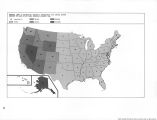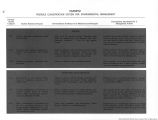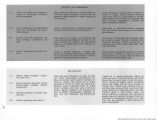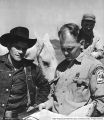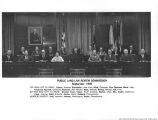| Title |
One third of the Nation's land : a report to the President and to the Congress / by the Public Land Law Review Commission. |
| Creator |
United States. Public Land Law Review Commission |
| Subject |
Public lands |
| Spatial Coverage |
United States |
| Publisher |
Washington, D.C. :; [For sale by the Supt. of Docs., U.S. G.P.O.] |
| Date |
1970 |
| Type |
Text |
| Format |
application/pdf |
| Digitization Specifications |
Pages were scanned at 400 ppi on Fujitsu fi-5650C sheetfed scanner as 8-bit grayscale or 24-bit RGB uncompressed TIFF images. For ContentDM access the images were resampled to 750 pixels wide and 120 dpi and saved as JPEG (level 8) in PhotoShop CS with Unsharp Mask of 100/.3. Foldout pages larger than 11" x 14" were captured using a BetterLight Super 8K-2 digital camera back on a 4x5 view camera (100mm Schneider APO lens). Oversize images were resampled to 1500 pixels wide. Optical Character Recognition (OCR) by ABBYY FineReader 7.0 with manual review. |
| Resource Identifier |
http://content.lib.utah.edu/cgi-bin/docviewer.exe?CISOROOT=/wwdl-doc&CISOPTR=5583 |
| Language |
eng |
| Relation |
Western Waters Digital Library |
| Rights Management |
Digital Image Copyright 2005, University of Utah. All Rights Reserved. |
| Contributing Institution |
S.J. Quinney Law Library, 332 South 1400 East, Salt Lake City, UT 84112-0730 |
| Source Physical Dimensions |
xiii, 342 p. illus. (part col.), col. maps (1 fold. inserted) 27 cm. |
| Scanning Technician |
Backstage Library Works - 1180 S. 800 E. Orem, UT 84097. |
| Call Number |
LC: KF5601.A55; GovDoc: Y 3.P 96/7:2ON 2 |
| ARK |
ark:/87278/s6dr2tt8 |
| Setname |
wwdl_documents |
| ID |
1136278 |
| Reference URL |
https://collections.lib.utah.edu/ark:/87278/s6dr2tt8 |


![page i [title page] page i [title page]](/dl_thumbs//01/ba/01bab0f6c23a3b273dc71f655b1cf751f0073610.jpg)

![page iii [letter of transmittal] page iii [letter of transmittal]](/dl_thumbs//bf/2a/bf2ac3732674583f91b95b184eb7dccff1e2873e.jpg)
![page iv [the commission] page iv [the commission]](/dl_thumbs//40/28/40283b228dd927b25a4ed685265c46d30ad09cac.jpg)
![page v [staff] page v [staff]](/dl_thumbs//fb/4e/fb4e958b42e8f82051f66187bafbacbeea049393.jpg)
![page vi [the advisory council] page vi [the advisory council]](/dl_thumbs//5d/bf/5dbfeb3dacef19182cfa23c277328a1b340a4e2a.jpg)
![page vii [the advisory council] page vii [the advisory council]](/dl_thumbs//34/fd/34fd69bbddf21610e957a5715081adfec2aea802.jpg)
![page viii [the advisory council] page viii [the advisory council]](/dl_thumbs//5f/c7/5fc734919c89f0e3ae26636934d7b3c67ca41da1.jpg)



























